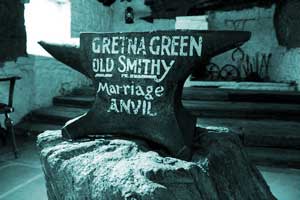In the South of Scotland sitting right on the border with England the small village of Gretna Green is a popular tourist destination. A small satellite to the slightly larger town of Gretna. For nearly 250 years it has been synonymous with runaway marriages and has in time become one of the most romantic places in Scotland, of not the World.

Scotland and England have always had different legal systems and this difference led to a blossoming business north of the border. In 1754 Lord Hardwicke pushed his ‘Marriage Act’ through the English Parliament. The act made it illegal for ‘minors’ (at that time anyone under age 21) to marry without parental consent. However, this law did not apply to Scotland where it was possible for boys over the age of 14 and girls over the age of 12 to wed without the consent of their parents.
This disparity on the two legal systems did not have any great effect in Gretna until the 1770s when a toll road passed through the nearby village of Graitney. Star crossed English (and Welsh) lovers could now run away to Gretna and wed without the fear of a parental veto.
Another factor was that in Scotland an allowance was made for ‘irregular marriages’. With an ‘irregular marriage’ almost anyone could conduct a marriage ceremony provided there were at least two witnesses. Being the time of horse drawn travel the blacksmiths along the route to Scotland became the ‘motorway service stations’ of their day and the blacksmiths of Gretna Green became known as the ‘Anvil Priests’. One notable blacksmith, Richard Rennison is said to have performed well over 5,000 ceremonies alone.
It was a wonderful piece of good fortune for the village, the symbol of the blacksmith’s horseshoe became known world over as a romantic symbol and the idea of a wedding ceremony performed over the anvil in a smokey blacksmiths workshop and the symbolism of the forging of a romantic union could not have been more perfect.
The author JM Barrie famously said: ‘There are few more impressive sights in the world than a Scotsman on the make’. I’ve never been sure if this was meant to be a compliment or an insult but I’ll take it as the former – Its impossible to deny that we Scots will always spot an opportunity when we see it and this opportunity was no different; by 1887 Gretna Green was already an incredibly popular visitor attraction (MacVegas anyone?). A Victorian Chronicler Robert Smith Surtes described it as ‘The Capital of the God of Love’
Gretna was a destination for altogether different reasons for the young Dennis Law. The Scottish footballing legend was reputed to have driven his heavily pregnant wife there when she was about to give birth to his first child to avoid them being born in England and thus eligible to play football for the English national team.
In modern times the difference between marriage law in Scotland and England is less of an issue. The age that people can marry both sides of the border is now 16 but parental consent is still required in England under 18. This has led to several soap opera storylines featuring the town and keeping it firmly on the romantic map. While Gretna nowadays is slightly more packed with the normal tourist trappings the old blacksmith shop is still worth a visit and weddings are still performed there and in venues nearby (though without an Elvis impersonator in sight).
Happy Valentines….
